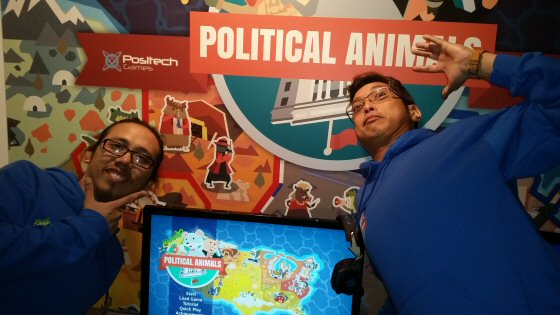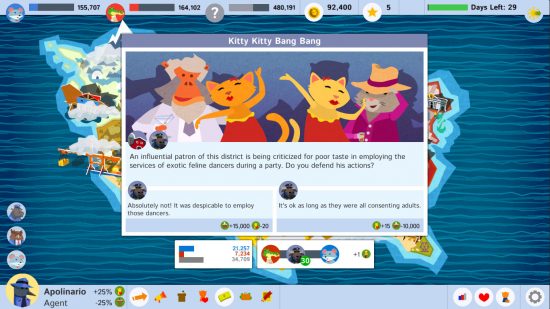15 days ago Positech released Political Animals, a fun PC strategy game based around cute animals fighting for political victory in a number of islands. The game had a general theme of corruption and ethics, and challenges the player to win an election by being the good guy/girl even when your opponent may be playing by different rules. The game is for PC/OSX and was released on Steam, Humble Store, GoG and direct from us through the humble widget. Without further ado, the website for the game is here: www.politicalanimalsgame.com
15 days after release is not nearly long enough to have a complete and fully-rounded insight into the ‘story’ of making and releasing the game, but its a good opportunity to get this stuff down in a blog post while its all fresh. So here is the warts-and-all post mortem on publishing and releasing the game. (You can read ryan sumos take on the same topic here).
How was it made?
My email account has 687 emails in the ‘Political Animals’ folder, dating back to September 26th, which was shortly after meeting Ryan Sumo for the first time in person at a UK games show. He was the artist on Prison Architect, and I know the Introversion devs well enough to shamelessly gate crash the odd meal with them, which is how I ended up sat opposite Ryan. (Interestingly I published Big Pharma after being sat next to Tim at another indie meal. Notice a pattern?). I love to think the world is a pure meritocracy, but to be honest, the fact that Introversion knew Ryan, and thought he was a good guy/reliable did influence me quite a bit. Physically meeting someone who can show you their game on a laptop is very,very different to a blind email pitch, there simply is no denying that. Anyway… to cut a long story short, me and Ryan exchanged a few emails and builds and eventually signed a contract at the end of October 2015.
Our plans for the development period of the game were pretty darned accurate. Initially we thought we would be releasing around the end of September/Early October 2016, and we missed that by just one month. Thats really not too bad for game development. Budget-wise, we also came in roughly close to what was planned. Making a game in the Philippines (where Ryans new studio:Squeaky wheel is based) is cheaper than the UK and we didn’t spend a vast amount on outside contractors. What we did do, is spend a lot more than expected on expos. Its amazing how keen I am for a game to be shown at a show when someone else has to go there instead of me! In total, I appeared at just one show, because it was in the UK and thus easy for me to arrange, plus I wanted to meet Ryan again, and meet another member of the team (marnielle).

I still have memories of us driving to a hotel bar to get a decent coffee and both of them going WHOAHHHH! when I accelerated my car a little bit :D.
There was some back-and-forth on design issues during the game, but actually not too much. I wanted the name changed from Party Animals to Political Animals, but the vast majority of the design stuff was entirely left to Squeaky Wheel. We hired a professional user-testing company to try the game out on innocent members of the public, which I found both helpful and reassuring (feedback was good). We were able to launch the game before the US elections, and everything looked pretty positive with some youtubers sounding very interested before the game was released.
How did it do?
Hmmm.
One thing I try to avoid is lying to myself or telling myself I did well when I didn’t. Its a pet hate and also a sign of being crap at business. Smart people learn from their mistakes, and you can’t learn from something you don’t think exists. I think that commercially, this failed, but ‘artistically’ it was a success. Also… to further add a disclaimer before I mention the sales… I am wholly convinced by the brilliant arguments of nicholas taleb, who points out that a string of successes means fuck all, if they were lucky, and a string of failures is no bad thing if you were unlucky. In other words, if you made all the right decisions, then took an informed, calculated and sensible risk…and you lose, then thats perfectly fine, and you should recognize this fact. He explains it better than me.
So far…Political Animals has not sold well. Its sold ‘ok’ for an indie strategy game on steam. You can see on steam spy how it did, if you are curious. We got some very positive lets play cover in the opening week (and beforehand), but the praise from youtubers somehow did not translate into purchases, although it did translate into a LOT of wishlist adds, which bodes well for the long term. Also we are on GoG, Humble Store & direct too, so steam isn’t the whole story here.

On paper…I have lost a big chunk of money on the game. My current hard statistical predictions suggest I will never recoup the cost, although those may well be out of date due to changes in the way steam promotes games since I collected most of my data. I would not be surprised to see that change. Mentally, I am resigned to losing a mid five figure sum on the game. if that turns out to be pessimistic, then yay!
What did I do right?
Picking Ryans game was a sensible move. He came recommended by good friends, he had worked on a bunch of games before. He seemed a nice guy. His team were affordable, being based in the Philippines. Ryan had a very clear idea of what he wanted in the game, and the team seemed to agree with this internally. Nobody resigned, nobody got fired, there were no arguments. Communication was good, Everyone seemed happy. Don (programmer):
 |
“I really think that we did our best in developing Political Animals. I was the last addition to the team and I didn’t have a hard time adjusting to my new teammates.” |
I know the team seemed a bit stressed at some points, especially with all the travel but…thats game dev :(.
We went to a LOT of shows, and I think this was worthwhile. Tristan (Designer):
 |
“I was optimistic about the game launch, because we have had good feedback during the shows” |
We spent money on user testing, which may have been a bit too expensive. Creative control was predominantly with the developers, and on issues where I thought they were wrong (I dislike the music, for example), it seemed I was the only one feeling that way. The game was made in unity and I’m not aware of any major technical issues. Translation went well, and we encountered very few bugs. We launched on time, and pretty much on budget. Everything flowed pretty well. In a break with normal practice, I handled the website design myself, and it seemed fine.
What did I do wrong?
We released the game at exactly the wrong time, with the wrong art style, and didn’t promote it with social media enough. We MAY have priced too high as well.
I assumed that releasing an election game in the lead-up to the most exciting US election in history would be awesome. I assumed that in October 2015. By October 2016…things were different. It was definitely an exciting election but for all the wrong reasons. Corruption wasn’t something we could laugh about in regards to a cartoon mouse, it was something on our TV screens..every…single..day. Political debate on social media was everywhere and corrosive. Far from being able to say “Cool someone just emailed us about a politics game! how timely!”, I think journalists ended up saying “FFS..A GAME about politics? enough already…”. In short, I think my assumption that releasing this game at this time would be a good thing was 100% wrong.
On the flipside I think releasing the same game NOW would be even worse. I make a living from political games, and I am SICK of politics right now. One can only imagine how the average gamer must feel about it…
To my credit, I’m not putting this down as a mistake. The game was being made already. Short of delaying it, and sitting on it for six months, I’m not sure we could have prevented this. Events overtook us. Events dear boy…
The art style was wrong. the art style is in fact…awesome:

…but it made it look like a kids game. We realised this and fought to get more screenshots out there with charts and graphs to emphasise the strategy nature of the game, but I suspect this was a losing battle. It *looks* like a casual children’s game on mobile. It really isn’t, but in some peoples minds it probably seems like it which also devalues the game… which brings me to…
The game released at $14.99 with a 10% launch discount. I think this is probably the right price *for the game*. I think this was the wrong price for a game launching at the wrong time with the wrong art style. I had made two mistakes (not changing the art style right at the start and then launching the game at the wrong time) and then compounded them by not compensating for this with pricing.
The final mistake we made was a failure to really embrace social media. Ryan went to a lot of shows, as did other members of his team, so there was a lot of personal meet & greet style stuff, but in social media terms, we didn’t ramp it up enough. We had a facebook page, and a twitter account, and even some cool twitter accounts for the candidates, but frankly we didn’t produce enough youtube content, and didn’t build up enough of a critical mass on twitter and facebook. I suspect that the team are not massive extroverts, and I’m not one either, and this probably showed. With rural English internet preventing me from using twitch, and useless Philippines internet preventing the devs from doing it either, we were already fighting with one hand behind our backs on that score.
Ryan:
 |
“I feel like I also slacked a little bit in terms of contacting press. While I did my best, I do think I could have tried a little bit harder. Perhaps knowing that Positech had brand recognition made me complacent.” |
and Marnielle:
 |
“I really didn’t know what to do during launch other than sharing the game to social media like a mad man. There’s a feeling of regret. I feel we could have done more.” |
Conclusions
I made a calculated bet with a lot of my ducks in a row. I am the indie politics game dude, this was always going to be a synergy win. It was a good team who did a quality job to make a game on time and budget. In other words, almost everything went right. We were unlucky with our launch timing, and maybe fumbled the art style & social media thing. I will definitely spend more time thinking about this sort of thing with future releases. Lessons have been learned. Pretty fucking expensive ones in my case, but as Quark says: “The riskier the road, the greater the profit”.
Political Animals is available RIGHT NOW:
